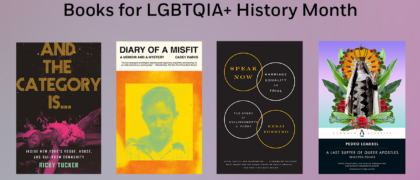“[Lemebel] speaks brilliantly for a difference that refuses to disappear.” —Garth Greenwell, The New Yorker
“He is one of the world’s great writers; everyone should read him.” —Garth Greenwell, The New York Times Book Review
“An exquisitely original writer . . . He uses humor, vulgarity, acidic commentary, and tenderness to describe the lives of the most marginalized people in his society. . . . The collection has been brilliantly edited and translated.” —The New Yorker
“This intoxicating and profane selection has been rendered into English with eye-bulging frankness by Gwendolyn Harper. Each brief ‘crónica’ . . . is a mini-revelation. Sexy, political and deeply humane, these coiled essays demonstrate clearly the perennial importance of radical speech acts. . . . Harper excels at capturing the spirit of source material often considered untranslatable. Significant lexical inspiration is required to express Lemebel’s arch, rat-a-tat punning, while ninja syntax skills are needed to re-create the fragments and convolutions of his sentences. What she makes of his crónicas retains the eccentricities of the original while being quite exquisite in English. . . . We all owe Penguin Classics a round of shots for A Last Supper of Queer Apostles.” —The Washington Post
“A sweeping view of Lemebel’s nonfiction work . . . A fine translation . . . Quick-witted, funny, sharp, angry, and just the right amount of performative . . . Lemebel was more than just a high-energy provocateur. . . . He wrote like no one else. . . . A seriously funny, unholy combination of postmodern critic and drag performer . . . he was painfully alive on almost every page. . . . Lemebel’s never-ending defiance, his resistance to being pigeonholed, and his use of resentment as a means of truth-telling have had an enduring effect on Latin American letters. . . . [Lemebel] capture[d] the murmuring voices that canonical literature in Spanish had left out . . . [and] open[ed] the way for new kinds of stories to be told.” —Los Angeles Review of Books
“This collection is a gift—kinetic and intoxicating. . . . In the pocket of every crónica is a middle finger pointed at commercial queerness. . . . While they have all the shape and texture of poetry, they’re positively electric with political critique. . . . Gwendolyn Harper’s translator’s note is the best of its kind, contextualizing Lemebel’s (eyebrow-raising) nomenclature. . . . In 1925, Virginia Woolf recorded a single positive review for Mrs. Dalloway in her diary: ‘This time you have done it—you have caught life and put it in a book.’ Perhaps this is the only way to summarize Pedro Lemebel’s A Last Supper of Queer Apostles.” —Judge’s appreciation, National Book Critics Circle Translation Prize
“Harper’s dazzling translation accomplishes what many translators dream of: preserving the essence of an iconic author’s voice as well as his refusals to bend to English. The saucy and obscene are ingeniously exalted here; we English readers are blessed to behold Lemebel’s queer glory through such a stunning translation.” —Judges’ citation, National Translation Award
“Explosive . . . Lucid and subversive . . . Showcases the extraordinary vigor and range of one of Latin America’s foremost queer dissident writers . . . Offer[s] a bracing insight into the survival of marginalized communities under dictatorship and beyond . . . An acrobatic and thoroughly researched translation . . . Gwen Harper[’s] handling of the artfulness and cultural specificity of Lemebel’s prose is remarkable.” —Judges’ citation, Queen Sofía Spanish Institute Translation Prize
“An extraordinary—a necessary—voice in world literature . . . Lemebel’s essays . . . are incantatory and mutant . . . mordant and at times feverish . . . florid to the point of camp . . . [a] mix of tenderness and subversion. . . . Part memoir, part reportage, part fantasia, they narrate history as it was experienced underground. . . . Lemebel wages a guerilla reckoning . . . in radically queer prose.” —4Columns
“A literary explosion . . . Lemebel’s writing is beautiful and vicious, and Harper has done a brilliant job translating it, while keeping it clear that Lemebel was not interested in being translated into something palatable for the English-speaking ears. I hope that, with this collection, the anglophone world will continue to expand its interest in world literature; not just the foreign, but the queer, the poor, the almost untranslatable.” —The London Magazine
“Striking . . . Sensually provocative . . . Harper’s translation is rich and graceful. . . . Lemebel’s stories are tender but raw, littered with jokes, innuendo and stabs at the heart. . . . [His] sharp-witted, bold protagonists insist on space that is never freely given. And he is one of them.” —The Times Literary Supplement
“What a joy for English readers to at last meet this humanist provocateur who celebrates and memorializes queer lives in a fascist state with fire, love, and a tireless spirit of play.” —Publishers Weekly
“[Lemebel] write[s] in lavish, loving, and mocking detail. . . . [His] writing leaps from slang to poetry, filth to beauty so quickly it collapses any distinction between them. . . . He created his own literary world. . . . The crónicas in A Last Supper of Queer Apostles still feel urgent. His phrases and clauses tumble over each other in their desire to get in one more joke, one more neologism, one more vignette, one more loca. . . . He flings the doors of his world and his spirit open. In Harper’s translation, this is as true as it is in the original. Lemebel may be dead now, and he may have hated English, but no matter: in A Last Supper of Queer Apostles, he’s right here, welcoming a new world of readers in.” —The Sewanee Review
“[Lemebel] went from being an outcast born into the underclass, to becoming a revered author whose work is now taught in high school in Chile. . . . The subversive genius is known for the playful use of Chilean expressions and gay slang, none of which are easily translated. But Gwendolyn Harper has done an admirable job. . . . Utilizing a blend of realism, surrealism, absurdism, camp, and whimsy, Lemebel’s essays combine reportage, memoir, fiction, history, and poetry to give voice to the underprivileged and the downtrodden. . . . Ever the renegade, Lemebel also has a sense of style all his own. It is both macro and micro in perspective, angry and lighthearted, but always eye-opening.” —The Bay Area Reporter
“This edition has been curated with care, and edited with great attention to detail. . . . The translation is sterling.” —The Leftovers
“Righteous rage, cutting humor, and lyric marvelousness unite Lemebel’s essays.” —Document Journal
“Spiky, relentlessly caustic . . . Lemebel’s essays here—stylish, challenging, and uncompromising— . . . direct us towards the revolutionary potential of outsiders.” —Tribune
“Lemebel doesn’t have to write poetry to be the best poet of my generation. . . . No one goes deeper than Lemebel. And also, as if that weren’t enough, Lemebel is courageous. That is, he knows how to open his eyes in darkness, in those territories where no one dares enter. . . . When everyone who has treated him like dirt is lost in the cesspit or in nothingness, Pedro Lemebel will still be a star.” —Roberto Bolaño, author of 2666 and The Savage Detectives
“If the world were just, Pedro Lemebel would take his rightful place on the throne of literary royalty; although I’m certain he’d reject something as anti-democratic as monarchy. A Last Supper of Queer Apostles cements his place in the canon—the literary one, the queer one, the Chilean one, the Latin American one, the human one. This collection of devastatingly gay and unabashedly political essays is, in fact, a quiver of exquisite arrows, each dipped in the blood and bile of love and hate, the only tincture with the viscosity of truth. On every one of these electrifying and gorgeously written pages—brilliantly translated by Gwendolyn Harper—Lemebel spills anti-fascist tea in dizzying prose that spins us ever closer to the collective liberation he was seeking. All hail this queen.” —Alejandro Varela, National Book Award finalist for The Town of Babylon
“Astonishing and tender and quite outrageous. I’m so glad I discovered Lemebel’s work—what a powerful, mould-breaking voice!” —Tomasz Jedrowski, author of Swimming in the Dark
“[Lemebel’s writing is] provocative, strange, very Chilean, cantankerous, bitter, funny, sentimental, sharp, elegant, entirely legible and at the same time complex. . . . His work was forged in the night, in the barrio, in life and not in literature. . . . His books changed lives.” —Alejandro Zambra, author of Multiple Choice and Chilean Poet
“The summary effect of reading Pedro Lemebel’s shattering indictment of the American-backed Pinochet regime, of being faced with the caustic rage embedded in it, corresponds to standing transfixed in front of Picasso’s Guernica, the lightbulb eyeball glaring down at the carnage below, the ocular shriek a fitting match for the illuminating text of A Last Supper of Queer Apostles, with its story of death and resurrection.” —James McCourt, author of Time Remaining and Queer Street
“Lemebel said he writes from difference, and my god, what a difference. His writing is everything except boring—courageous, beautiful, vile, glorious, provocative, comforting, angry, loving, exquisite, and full of delicious venom. Reading a great writer makes life better. Reading Lemebel makes me want to live better.” —Rabih Alamaddine, author of An Unnecessary Woman
“Reading these powerfully intimate essays makes me feel like I know Pedro Lemebel. His friends are now my friends. The clothes they wore, the way the danced, the way they died—all this will live on in my memory as if I’d always had them in my life.” —Joe Westmoreland, author of Tramps Like Us
“A remarkable and radically uncompromising chronicle of queer life in anti-queer times . . . Gwendolyn Harper’s translation is astoundingly good. It allowed me to feel that I was being spoken to directly. And to know that Lemebel’s personality, his poetry, his love, his grief, his anger, his generosity, his voice, are all still with us, and still true. Pedro Lemebel is alive! And I am in love.” —Keith Ridgway, author of Hawthorn and Child and A Shock
“A truly astonishing body of work . . . Images so alarming and original leap from every page, you come to believe that if you were to tear a page it would bleed scarlet. . . . The writings of a curbside saint laboring serene under a weight of genius.” —Lauren John Joseph, author of At Certain Points We Touch
“This book reminds me of Jean Genet, of the late great Juan Goytisolo—of everything that I love about truly queer writing. It shares their rage, their laughter, their fierceness, and their courage. A truly sensational addition to our collective heritage.” —Neil Bartlett, author of Ready to Catch Him Should He Fall
“Extraordinary . . . A testament to the far more varied and beautiful truths about who lives and falls in love in Chile, beyond the fathers that have dominated its literature . . . Prepare to be wrecked and resurrected, to be pulled into the world of characters who come immediately to life and who will not leave you. . . . Lemebel had a tremendous gift for unexpected metaphors, for how to conjure the singularity of a person through one striking sensual detail. . . . Gwendolyn Harper’s lively translations in this volume contain all sorts of inventive recreations of Lemebel’s exacting slices into the intestines of Chilean speech. . . . I hope this volume will begin a long overdue international conversation about, and celebration of, Lemebel’s exhilarating work . . . a body of work that deserves a far more prominent place in the international canon of writing that has expanded humanity’s understanding of itself.” —Idra Novey, from the Foreword
“Lemebel’s critique of the western colonisation of sexual identity was almost as vicious as it was of the Pinochet dictatorship.” —The Observer (London)








